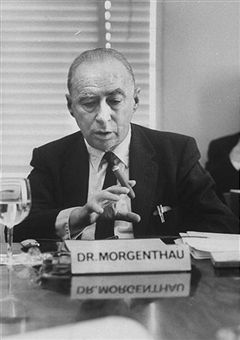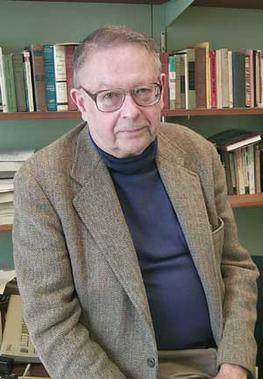Related Research Articles
Neorealism or structural realism is a theory of international relations that emphasizes the role of power politics in international relations, sees competition and conflict as enduring features and sees limited potential for cooperation. The anarchic state of the international system means that states cannot be certain of other states' intentions and their security, thus prompting them to engage in power politics.

International relations (IR) are the interactions among sovereign states. The scientific study of those interactions is called international studies, international politics, or international affairs. In a broader sense, it concerns all activities among states—such as war, diplomacy, trade, and foreign policy—as well as relations with and among other international actors, such as intergovernmental organizations (IGOs), international nongovernmental organizations (INGOs), international legal bodies, and multinational corporations (MNCs). There are several schools of thought within IR, of which the most prominent are realism, liberalism, and constructivism.
International relations theory is the study of international relations (IR) from a theoretical perspective. It seeks to explain behaviors and outcomes in international politics. The four most prominent schools of thought are realism, liberalism, constructivism, and rational choice. Whereas realism and liberalism make broad and specific predictions about international relations, constructivism and rational choice are methodological approaches that focus on certain types of social explanation for phenomena.

Hans Joachim Morgenthau was a German-American jurist and political scientist who was one of the major 20th-century figures in the study of international relations. Morgenthau's works belong to the tradition of realism in international relations theory; he is usually considered among the most influential realists of the post-World War II period. Morgenthau made landmark contributions to international relations theory and the study of international law. His Politics Among Nations, first published in 1948, went through five editions during his lifetime and was widely adopted as a textbook in U.S. universities. While Morgenthau emphasized the centrality of power and "the national interest," the subtitle of Politics Among Nations—"the struggle for power and peace"—indicates his concern not only with the struggle for power but also with the ways in which it is limited by ethical and legal norms.

Kenneth Neal Waltz was an American political scientist who was a member of the faculty at both the University of California, Berkeley and Columbia University and one of the most prominent scholars in the field of international relations. He was a veteran of both World War II and the Korean War.

In international relations theory, realism is one of the dominant schools of thought, theoretically formalizing the statesmanship of Realpolitik of early modern Europe. Although a highly diverse body of thought, realism is unified by the belief that world politics is always and necessarily a field of conflict among actors pursuing wealth and power. The theories of realism contrast with the cooperative ideals of liberalism in international relations.
Robert Gilpin was an American political scientist. He was Professor of Politics and International Affairs at the Woodrow Wilson School of Public and International Affairs at Princeton University where he held the Eisenhower professorship.
In international relations theory, the concept of anarchy is the idea that the world lacks any supreme authority or sovereignty. In an anarchic state, there is no hierarchically superior, coercive power that can resolve disputes, enforce law, or order the system of international politics. In international relations, anarchy is widely accepted as the starting point for international relations theory.

Thazha Varkey Paul is an Indo-Canadian political scientist. He is a James McGill professor of International Relations in the department of Political Science at McGill University. Paul specializes in International Relations, especially international security, regional security and South Asia. He served as the president of the International Studies Association (ISA) during 2016–2017, and served as the founding director of the McGill University – Université de Montreal Centre for International Peace and Security Studies (CIPSS).

Theory of International Politics is a 1979 book on international relations theory by Kenneth Waltz that creates a structural realist theory, neorealism, to explain international relations. Taking into account the influence of neoclassical economic theory, Waltz argued that the fundamental "ordering principle" (p. 88) of the international political system is anarchy, which is defined by the presence of "functionally undifferentiated" (p. 97) individual state actors lacking "relations of super- and subordination" (p. 88) that are distinguished only by their varying capabilities.
Randall L. Schweller is Professor of Political Science at the Ohio State University, where he has taught since 1994.
Paul W. Schroeder was an American historian who was professor emeritus at the University of Illinois. He specialized in European international politics from the late 16th to the 20th centuries, Central Europe, and the theory of history. He is known for his contributions to diplomatic history and international relations.
Dr William Bain is a professor at the National University of Singapore, and previously senior lecturer at the University of Wales, Aberystwyth in the department of International Politics. He attended the University of South Carolina where he obtained a BA. He also attended University of British Columbia in Vancouver where he achieved an MA and PhD. Prior to joining UWA he lectured at University of Glasgow in international relations theory, international ethics, and eighteenth century political thought. He was previously a marine and served in the First Gulf War. He also has a beloved cat named Frankie.

Yan Xuetong is a Chinese political scientist and serves as a distinguished professor and dean of the Institute of International Relations at Tsinghua University. Yan is one of the major Chinese figures in the study of international relations (IR). He is the founder of 'moral realism', a neoclassical realist theoretical paradigm in IR theory. His moral realist theory is based on political determinism.

Daniel W. Drezner is an American political scientist. He is known for his scholarship and commentary on International Relations and International Political Economy.

Jennifer Sterling-Folker is a Professor of Political Science at the University of Connecticut. She was the Alan R. Bennett Honors Professor of Political Science. She is a specialist in International Relations theory.
Neoclassical realism is a theory of international relations and an approach to foreign policy analysis. Initially coined by Gideon Rose in a 1998 World Politics review article, it is a combination of classical realist and neorealist – particularly defensive realist – theories.

Classical realism is an international relations theory from the realist school of thought. Realism makes the following assumptions: states are the main actors in the international relations system, there is no supranational international authority, states act in their own self-interest, and states want power for self-preservation. Classical realism differs from other forms of realism in that it places specific emphasis on human nature and domestic politics as the key factor in explaining state behavior and the causes of inter-state conflict. Classical realist theory adopts a pessimistic view of human nature and argues that humans are not inherently benevolent but instead they are self-interested and act out of fear or aggression. Furthermore, it emphasizes that this human nature is reflected by states in international politics due to international anarchy.
Charles Louis Glaser is a scholar of international relations theory, known for his work on defensive realism, as well as nuclear strategy. He is the founding director of the Institute for Security and Conflict Studies at the George Washington University's Elliott School of International Affairs, as well as a professor of political science and international affairs. His best-known book, Rational Theory of International Politics: The Logic of Competition and Cooperation received an Honorable Mention for 2011 Best Book from the International Security Studies Section of the International Studies Association.
Jeffrey W. Taliaferro is an American political scientist and international relations scholar. He is a professor of Political Science at Tufts University. His teaching and research focus on security studies and international relations theory.
References
- ↑ "Norrin Ripsman off to Harvard Concordia University". Concordia University . Retrieved 2022-12-30.
- ↑ "Norrin M. Ripsman | International Relations". Lehigh University . Retrieved 2022-12-27.
- ↑ "Norrin Ripsman". Wilson Center . Retrieved 2022-12-27.
- ↑ "Research". Belfer Center for Science and International Affairs. Retrieved 2022-12-27.
- ↑ "Neoclassical Realist Theory of International Politics". Peace Research Institute Oslo . Retrieved 2022-12-27.
- ↑ Ripsman, Norrin M. (2011-06-13). "Neoclassical Realism". Oxford Research Encyclopedia of International Studies. doi:10.1093/acrefore/9780190846626.013.36. ISBN 978-0-19-084662-6 . Retrieved 2023-01-01.